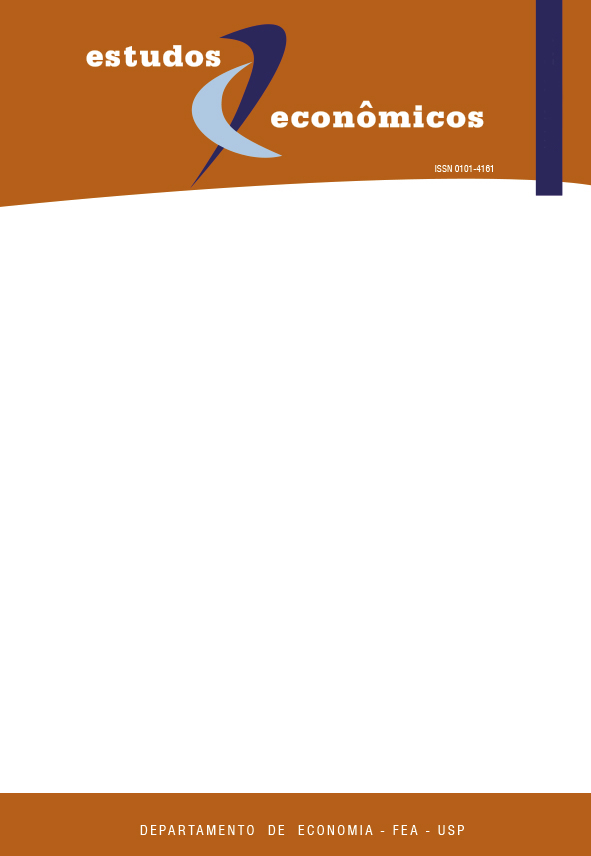The impact of government income transfers on the Brazilian job market
DOI:
https://doi.org/10.1590/1980-53574312emsmKeywords:
income transference, labor supply, selection biasAbstract
This paper intends to analyze the impact of transferences over the formal and informal labor supply from the family heads. For the analyze of the effects in scope of the entrance decisions in job market it was estimated a multinomial logit, while in the scope of the working time it was used a variation of the method of Durbin and McFadden (1984)for selection bias correction. It has verified that transferences have positive effect over the probabilities that the individual doesn’t work and does informally work. However,this last one seems to be related to a substitution effect, once it has been observed a parallel negative effect over the probability to work on the formal sector. It has been obtained yet that the benefits negatively impacts on the offered hours by the family heads whether in the formal or non-formal sector, effect that has happened to be verified on the hours offering in formal sector of all individuals. On the other hand, as we consider the hours of working of those who are engaged in informal sector, it has obtained that income transferences perform not as a discourage issue but as a magnifier factor of worked hours.
Downloads
References
AMEMIYA, T. Regression and ordered categorical variables. Journal of the Royal Statistical Society Series, B 46: 1-30, 1981.
BOURGUIGNON, F.; FERREIRA, F.H.G.; LEITE, P,G. Ex ante evaluation of conditional cash transfers programs: the case of bolsa escola.. The Willian Davidson Institute, University of Michigan, 2002 (Working Paper, n. 516). Disponível em: “http://www.wdi.umich.edu/files/Publications/WorkingPapers/wp516.pdf” Último acesso em: 15/03/2010.
BOURGUIGNON, F; FOURNIER, M.; GURGAND, M. Selection bias corrections based on the the
multinomial logit model: Monte-Carlo compararisons. Delta, 2004 (Working Paper, n. 2004-20).
Disponível em: “http://www.delta.ens.fr/abstracts/wp200420.pdf”. Último acesso em: 15/03/2010.
CARDOSO, E.; SOUZA, A.P. The impact of income transfers on child labor and school attendance in Brazil. Vanderbilt University, 2004 (Working Paper, n. 04-W07). Disponível em: “http://www.vanderbilt.edu/Econ/wparchive/workpaper/vu04-w07.pdf”. Último acesso em: 15/03/2010.
CAVALCANTI, T.; CORRÊA, M. Income transfers and labor market. IV Encontro CAEN-EPGE de
Políticas Públicas e Crescimento Econômico, Jun.2009. Disponível em: “http:www.virtualbib.
fgv.br/ocs/sbe/ebe09/paper/view/937/329”. Último acesso em: 15/03/2010.
CHENG, S.; LONG, J.S. Testing for IIA in the multinomial logit model. Sociological Methods &
Research, 35 (4): 583-600 (2007).
CORSEUIL, C.H.; FOGUEL, M. N. Uma sugestão de deflatores para rendas obtidas a partir de algumas pesquisas domiciliares do IBGE. Rio de Janeiro: IPEA, 2002 (Texto para discussão, n. 897). Disponível em: “http://www.ipea.gov.br/pub/bcmt/mt_019m.pdf”. Último acesso em: 15/03/2010.
DANZIGER, S.; HAVEMAN, R.; PLOTNICK, R. How income transfers programs affect work, savings, and the income distribution: a critical review. Journal of Economic Literature, 19: 975-1028, 1981.
FERNANDES, R.; PAZELLO, E.T. Avaliação das políticas sociais: incentivos adversos, focalização
e impacto. In: LISBOA, M.; MENEZES-FILHO. N. A. Microeconomia e Sociedade no Brazil.
Rio de Janeiro, 2001.
FERRO, A.R.; KASSOUF, A.L. Avaliação do impacto do programa bolsa-escola sobre o trabalho infantil no Brasil. Pesquisa e Planejamento Econômico. 35(3): 417-444, 2005.
FREESE, J.; LONG. J.S. Regression models for categorical dependent variables using stata. 2ª ed. Texas: Stata Press Publications, 2006.
HECKMAN, J. The Common Structure of Statistical Models of Truncations, Sample Selection, and Limited Dependent Variables and a Simple Estimator for Such Models. In: Annals of Economic and Social Measurement, 5: 475-492, 1976.
HOFFMANN, R. Transferências de renda e a redução da desigualdade no Brasil e cinco regiões entre 1997 e 2004. Econômica, 8 (1): p.55-81, jun.2006.
SOARES, F.V.; SOARES, S; MEDEIROS, M.; OSÓRIO, R.G. Programas de transferências de renda
no Brasil: impactos sobre a desigualdade e pobreza. Brasília: IPEA, 2006 (Texto para Discussão, n. 1.228). Disponível em: “http://www.anpec.org.br/encontro2006/artigos/A06A156.pdf”. Último acesso em: 15/03/2010.
MCFADDEN, D. Conditional logit analysis of qualitative choice behavior. In: ZAREMBKA, P. (ed.). Frontiers of Econometrics. New York: Academic Press, 1973, pp. 105-142.
TAVARES, P.A. Efeito do programa bolsa família sobre a oferta de trabalho das mães. In: Anais do XXXVI Encontro Nacional de Economia. ANPEC, 2008. Disponível em: “http://www.anpec.org.br/encontro2008/artigos/200807211028050-.pdf”. Último acesso em: 15/03/2010.
WOOLDRIGDE, J.M. Econometric analysis of cross section and panel data. Cambridge, Massachusetts: The MIT Press, 2002.
Downloads
Published
Issue
Section
License
Copyright (c) 2013 Emerson Marinho, Sérgio Mendes

This work is licensed under a Creative Commons Attribution-NonCommercial 4.0 International License.
By submitting an article, the author authorizes its publication and attests that it has not been submitted to any other journal. The original article is considered final. Articles selected for publication are proofread for grammatical and orthographic errors. The journal does not pay rights for published articles. The Institute of Economic Research from the School of Economics, Business and Accounting of the University of São Paulo (Instituto de Pesquisas Econômicas da Faculdade de Economia, Administração e Contabilidade da Universidade de São Paulo) owns the journal's copyright.




